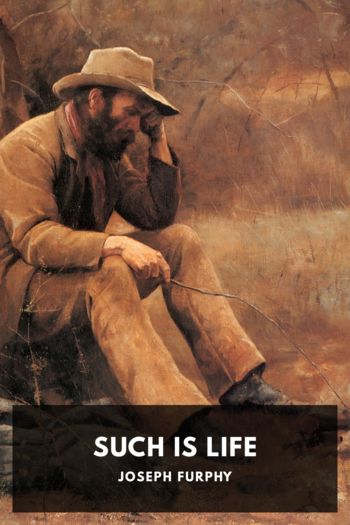Such Is Life by Joseph Furphy (children's books read aloud .TXT) 📕

- Author: Joseph Furphy
Book online «Such Is Life by Joseph Furphy (children's books read aloud .TXT) 📕». Author Joseph Furphy
“You allee same Christian,” I remarked, packing away my breakfast-service. “You go long-a good place bimeby.”
“Me Clistian allee same you,” he replied, not without dignity “Convelt plully long time. ‘Paul’ Clistian name. Splink’ wattel, all li.”
With this he bade me a civil goodbye, and went his way. Then I saddled-up and started for the Trinidad; mentally placing Mr. Smythe, Bert, and myself, in one dish of the moral scale, and this undesirable alien in the other, with an unflattering upshot to the superior race.
And this conclusion was more than verified when I reached my destination. The grass was something splendid. Any island or peninsula of plain among the tall lignum would do for a camp; and there was a good waterhole about a mile away, with only a low, slack fence to cross.
Between one thing and another, it might have been about three in the afternoon when, with Pup reposing by my side, I finally settled down to an after-dinner smoke from the sage meerschaum often deservedly noticed in these annals.
The two greatest supra-physical pleasures of life are antithetical in operation. One is to have something to do, and to know that you are doing it deftly and honestly. The other is to have nothing to do, and to know that you are carrying out your blank programme like a good and faithful menial. On this afternoon, the latter line of inaction seemed to be my path of duty—even to the extent of unharnessing my mind, so that when any difficulty did arise, I might be prepared to meet it as a bridegroom is supposed to meet his bride. Therefore whenever my reasoning faculties obtruded themselves, I knapp’d ’em o’ the coxcombs with a stick, and cry’d “Down, wantons, down.” Briefly, I kept my ratiocinative gear strictly quiescent, with only the perceptive apparatus unrestrained, thus observing all things through the hallowed haze of a mental sabbath. There is a positive felicity in this attitude of soul, comparing most favorably with the negative happiness of Nirvana.
“Taking it easy, Tom?” conjectured a familiar voice.
“No, Steve,” I murmured, without even raising my eyes. “Tea in the quart-pot there. What are you after? Or is someone after you?”
“Prospecting for a bite of grass.”
“Well, you’ve bottomed on the wash. Thought you were out to Kulkaroo, with salt?”
“Just getting down again, with a half-load of pressed skins. Bullocks living on box-leaves and lignum. Rode over to get the geography of this place by daylight. Saunders, the fencer, told me about it this morning. He’s got a ten-mile contract away on Poolkija, and he’s going out with three horses and a dray-load of stores for himself. Dray stopped on the road for the last week, with his wife minding it. Horses supposed to be lost in the lignum on Yoongoolee, and him hunting them for all he’s worth. Keeps them planted all day, and tails them here at night. He wouldn’t have laid me on, only that he’s going to drop across them tomorrow morning, and shift.”
“Anyone coming with you tonight?”
“Baxter and Donovan. It’s a good step to travel—must be ten or twelve mile—but this grass is worth it. Safe, too, from what I hear. Might get two goes at it, by taking the bullocks out at daylight, and planting them till night. However, I must get back, to meet the other chaps with the mob.”
“Well, I’ll be here when you come.”
Thompson turned his horse, and disappeared round a promontory of lignum. By this time, the sun was dipping, dusky red, toward the smoky horizon; so I addressed myself to the duties of the evening, which consisted in taking my horses and Pup to the water, and bringing back a supply for myself. Also, as a concession to the new aspect of things, I took the bell off Cleopatra.
Daylight had now melted into soft, shadowless moonlight; and the place was no longer solitary. Dozens of cattle were scattered round, harvesting the fine crop of grass; and Thompson, with his two confederates, joined me. During daylight, I had made it my business to find a secluded place, bare of grass, where a fire could be kindled without offending the public eye; and to this spot the four of us repaired to see about some supper.
Before the first match was struck, a sound of subdued voices behind us notified the coming of two more interlopers.
One of these was Stevenson, a tank-sinker, now on his way northward with twenty-two fresh horses—fresh, by the way, only in respect of their new branch of industry, for the draft was made-up entirely of condemned coachers from Hay, and broken-down cab-horses from Victoria.
The other arrival was a Dutchman, who brought his two ten-horse teams. A thrifty, honest, sociable fellow he was; yet nothing but the integrity of narrative could possibly move me to repeat his name. It was Helsmok, with the o sounded long. The first time I had addressed him by name—many years before—a sense of delicacy had impelled me to shorten the vowel, also to slur the first syllable, whilst placing a strong accent on the second. But he had corrected me, just as promptly as Mr. Smythe would have done if I had called him Smith, and far more civilly. He had even softened the admonition by explaining that his strictness arose from a justifiable family pride, several of his paternal ancestors having been man-o’-war captains, and one an admiral—in which cases, the name would certainly seem appropriate. But some Continental surnames are sad indeed. The roll-call of Germany furnishes, perhaps, the most unhappy examples. There are bonâ fide German names which no man of refinement cares





Comments (0)